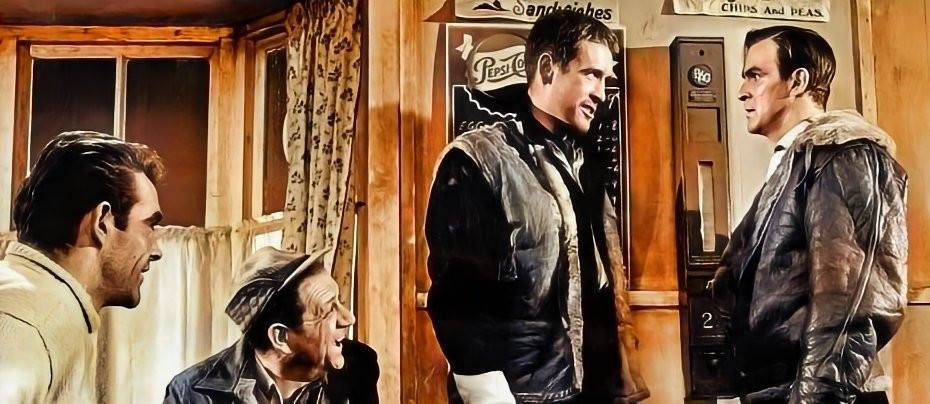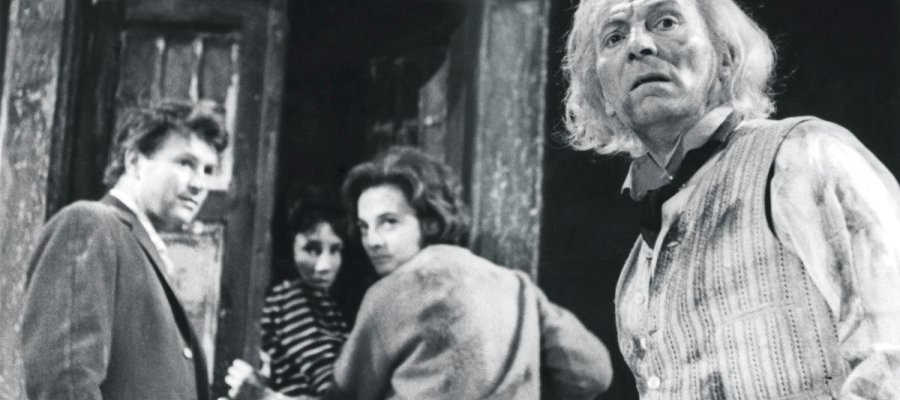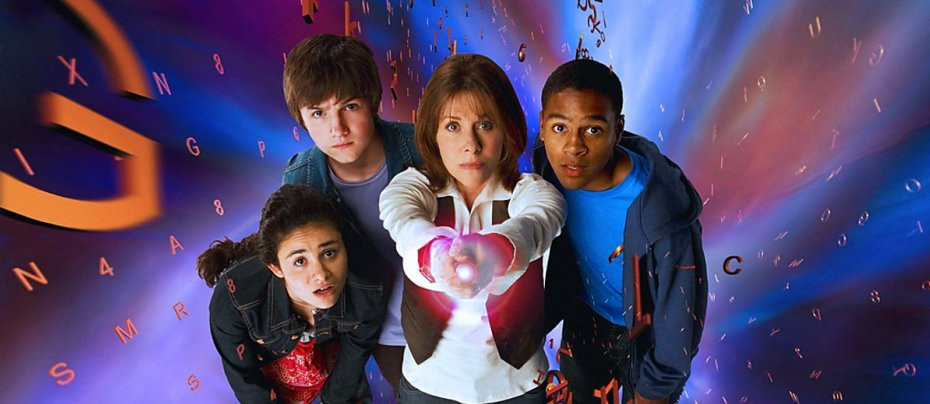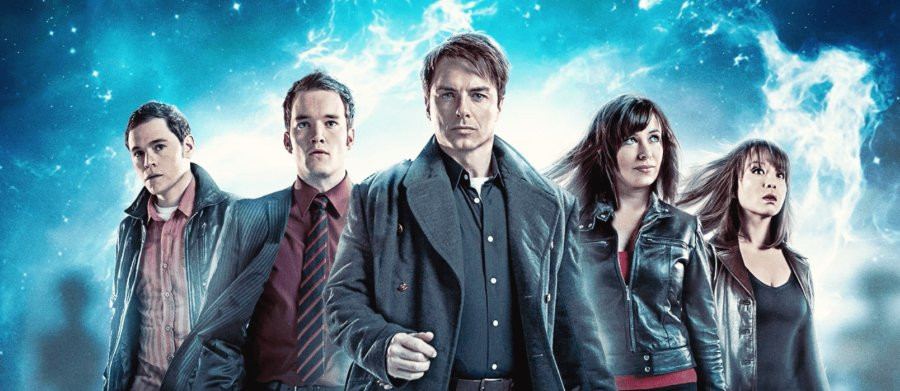The Romans
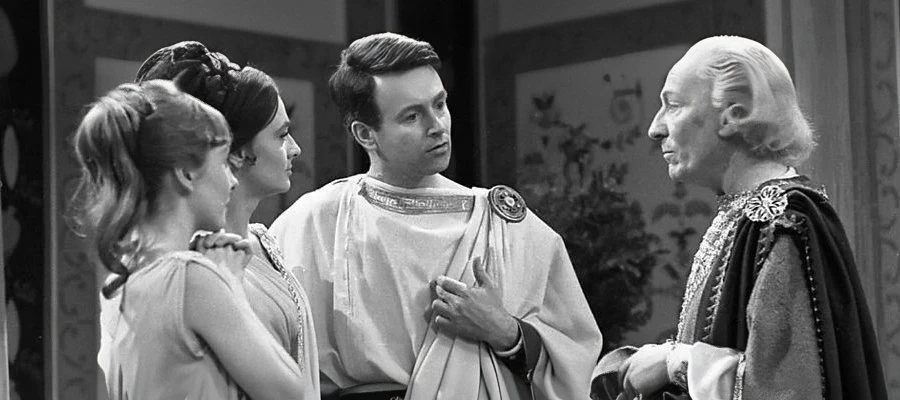
Review – Laurence Marcus
Following the subtle tonal shift in Doctor Who’s previous adventure, The Rescue, The Romans marked a much more noticeable change for the series. It was the first story to blend strong comedic elements within its dramatic plot, signalling a new direction for the show.
Although story editor David Whitaker had begun to see the historical episodes, which alternated with science-fiction stories in the first season, as potentially restricting, The Romans, set in AD 64 (or LXIV, for those who prefer their numbers with a touch of Latin flair), was originally conceived as part of a trio of historical adventures. The other planned stories were set during the Spanish Armada and the American Civil War. While those two stories were ultimately abandoned, historical episodes continued to feature regularly throughout the second and third seasons.
For The Romans, series producer Verity Lambert encouraged writer Dennis Spooner to incorporate humour, offering a fresh perspective and tone for the programme. The critical response was mixed: some praised this new approach, while others questioned its effectiveness.
In the opening scene, the TARDIS materialises precariously on the edge of a cliff. Before the Doctor can react, it tilts and tumbles over, crashing to the ground below. However, viewers anticipating a dramatic rescue were likely left surprised, or perhaps disappointed, as the scene abruptly fades out, only to resume a month later in the storyline, finding our heroes living in the lap of luxury in a villa near Rome.
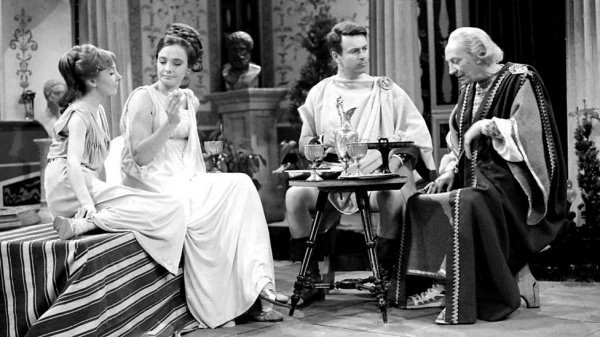
The Doctor, Ian, and Barbara are enjoying their stay in ancient Rome, but Vicki is growing bored with the quiet life and yearns for adventure. She and Barbara head into the bustling village market, unaware they’re being watched by two suspicious Romans, Didius and Sevcheria. As the women chat about London, an elderly market stall owner overhears them. Later, the two Romans bribe her for information, and she reveals that Barbara and Vicki have been house-sitting for Flavius Giscard, who is away campaigning in Gaul. Armed with this knowledge, Didius and Sevcheria depart. At the same time, an elderly lyre player named Maximus Pettulian leaves the village - but he doesn’t get far before he is ambushed and killed on the road.
Meanwhile, back at Giscard’s villa, the Doctor announces his intention to travel to Rome, inviting Vicki to join him. Once packed, they leave Ian and Barbara behind to enjoy the rest of their holiday. But that very evening, Didius and Sevcheria return and prepare to attack. As Ian and Barbara are relaxing, the two intruders launch a surprise assault. Ian and Barbara fight back bravely, but in the struggle, Barbara accidentally strikes Ian on the head with a jug intended for Sevcheria, knocking him unconscious. The two are then captured and carried off by the attackers.
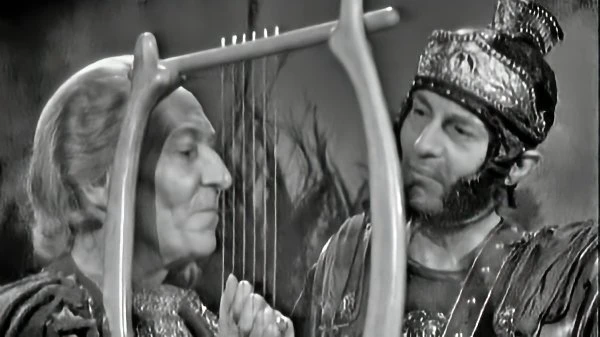
While traveling along the road out of the village, the Doctor and Vicki stumble upon the body of Maximus Pettulian. As they examine the scene, they are confronted by a centurion with his sword drawn. Noticing the Doctor holding Pettulian’s lyre, the soldier asks if it belongs to him. The Doctor gives a vague response, prompting the centurion to explain that he has been sent by his master, Emperor Nero, to retrieve the musician. Seizing the opportunity, the Doctor can't resist posing as Pettulian in order to gain an audience with Nero.
Back at the villa, Ian and Barbara are bound to a slave cart. Didius and Sevcheria negotiate with a slave trader who expresses interest in buying Barbara. However, they decline, insisting she will fetch a much higher price in Rome. The trader, unwilling to travel to the city, agrees instead to purchase three male slaves - including Ian. As Ian is taken away, Barbara is left behind, more terrified than ever now that they’ve been separated.
Barbara is transported to Rome, where she is thrown into a jail cell to await a slave auction, soon to be sold to the highest bidder. Meanwhile, Ian has spent five gruelling days chained to an oar aboard a slave galley. When a violent storm strikes, he seizes the moment to plot his escape.
By this time, the Doctor and Vicki have arrived in Rome and are exploring the city. As they wander through a busy square, Vicki notices a crowd gathered around an auction and asks what is being sold. Realising it's a slave auction, the Doctor quickly steers her away, avoiding the need to explain. As they turn to leave, they unknowingly miss Barbara, who has just stepped onto the auction platform. She is the first to be sold and is purchased by Tavius, an official in Nero’s court, who buys her to serve in the Emperor’s household.
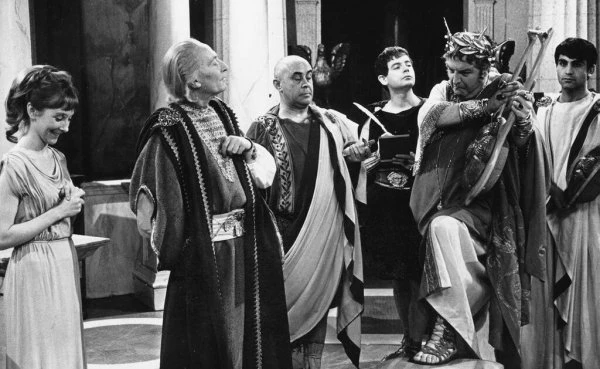
Tavius warns Barbara that any attempt to escape would result in a death sentence. Undeterred, Barbara insists she’s willing to take that risk. Their conversation is cut short when a messenger arrives, announcing that Maximus Pettulian has arrived. Tavius quickly leaves and greets the Doctor, whom he believes to be the musician. As they begin to speak, their meeting is interrupted by the sudden arrival of Emperor Nero. Introduced to the Doctor, Nero immediately demands a musical performance. The Doctor, thinking quickly, cajoles the Emperor by suggesting he would prefer to hear Nero play first. Flattered and more than a little vain, Nero obliges after which the Doctor mimics his playing. Delighted, Nero expresses his approval and says he looks forward to speaking with the Doctor again later.
Meanwhile, Ian arrives in Rome alongside Delos, a fellow escapee. However, their freedom is short-lived as they are quickly recaptured and taken to the same prison where Barbara was once held. They're told they will be trained as gladiators and forced to fight for their lives in the arena - against each other.
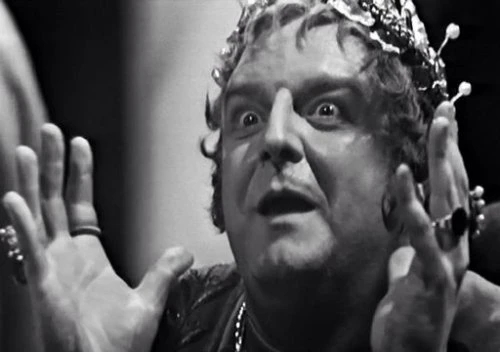
Nero insists that the Doctor fulfil his musical duties, arranging a lavish banquet in his honour where the Doctor must play the lyre. At the same time, Nero becomes infatuated with Barbara and begins to pursue her. This infatuation sparks the ire of Empress Poppaea, who warns Barbara to stay away from Nero. She makes it clear that, as Empress for many years, she has no intention of letting anyone challenge her position. However, when Poppaea later witnesses Nero becoming overly familiar with Barbara, she decides that stronger measures are necessary.
By now, Vicki has struck a rather unconventional friendship with Locusta, the imperial court poisoner — a woman who, as it turns out, is permanently kept busy concocting lethal draughts for Rome’s political elite and navigating the deadly intrigues of Nero’s court. Their morbid chat is cut short by the sudden appearance of Poppaea. Vicki hides nearby and overhears Poppaea whispering a deadly errand to Locusta: she wants a slave girl poisoned, posthaste. Vicki waits for the pair to leave, then daringly swaps the cups — plotting to have Nero himself sip the poison instead.
Back in the banquet hall, Nero is in the middle of delivering what he no doubt believes is world-class flirting to Barbara, but his moment is cut short when a servant arrives with two goblets of wine. Vicki, horrified, informs the Doctor that she has poisoned Nero, convinced that he and Poppaea need to be stopped. The Doctor swiftly prevents Nero from drinking, reminding Vicki that altering history is strictly forbidden in time travel.
Now safe, Nero takes Barbara to the arena to watch the gladiatorial battles, and she is horrified to see Ian among the fighters. During the match, Ian and Delos face off. Ian disarms Delos but refuses to kill him. They fight again, and this time Delos disarms Ian. As Nero gives Ian a thumbs down, signalling his death, Delos hesitates. In a moment of change of heart, he turns on Nero and attacks him instead of killing Ian. A fight breaks out between Delos, Ian, and Nero's guards, but the two men manage to escape.
Elsewhere in the palace, the Doctor and Vicki stumble upon Nero’s architectural plans for a redesigned Rome. Before they can examine them closely, Nero enters and announces that the Doctor is to perform at the arena the next evening. The Doctor agrees, but while fiddling with his spectacles, he positions them in a way that causes sunlight to ignite the plans on the table. Nero is initially enraged, threatening to have the Doctor thrown to the alligators. However, his anger quickly turns to excitement as he realises that if Rome were to burn, he could rebuild it according to his vision. He praises the Doctor for the "inspiration" and decides to act immediately.
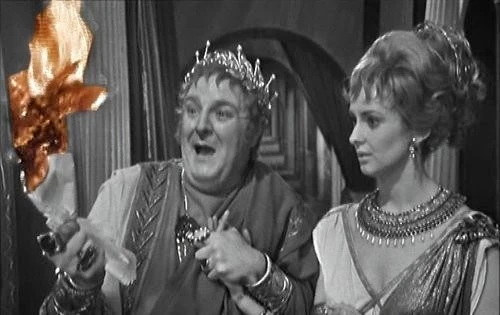
That night, Nero summons a group of men to the palace, offering them generous payment to set the city ablaze. As the arsonists are being briefed, the Doctor and Vicki seize the opportunity to escape. Unbeknownst to them, Ian and Barbara are also making their escape at the same time. Both couples, independently return to the villa and prepare to leave in the TARDIS. During the entire adventure neither of the two parties have been aware of the others involvement.
At the time of broadcast, The Romans received a mixed response. While many praised its daring use of comedy and William Hartnell’s energetic performance — clearly enjoying himself as the mischievous Doctor — others felt the tonal departure from more serious historical storytelling undermined the drama. And then there’s Nero himself, a man depicted as an overgrown toddler with a crown, who mostly wants to fiddle, feast, and flirt his way through history. His pursuit of Barbara (evoking comparisons to Carry On Cleo, which had been released the year before), was seen by some as too broad or even inappropriate for the show’s usual tone.
However, modern reappraisal has been far kinder. Today, The Romans is often praised for its inventiveness, wit, and the way it pushes the boundaries of what Doctor Who could be. Hartnell’s comedic timing, Maureen O’Brien’s spirited Vicki, and the well-balanced direction have earned the serial a place among the more memorable stories of the First Doctor’s era. The blend of humour and historical setting is now seen as a precursor to the show’s later flexibility in tone and genre.
Critics and fans alike recognise The Romans as a turning point; where Doctor Who proved it could experiment with style and not take itself too seriously. And while the tone veers wildly between farce and historical drama, there’s an undeniable charm in watching the First Doctor and company stumble through Rome like chaos incarnate in togas. It’s not without its flaws, the pacing can drag at times, and the tonal whiplash between comedy and violence is occasionally jarring, but it remains an ambitious and entertaining piece of early Doctor Who.


